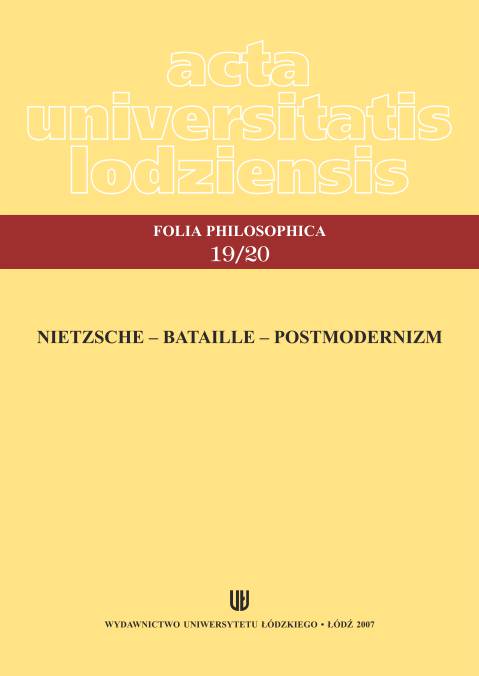Więcej niewiadomych wytrzymać w dziejach myślenia. Dialogi Junga i Heideggera z Nietzschem
DOI:
https://doi.org/10.18778/0208-6107.19-20.06Abstrakt
The article, being a part of the just prepared book, deals with two different interpretations of Nietzschean text. C. G. Jung devoted five years' Seminar to discuss "Thus spoke Zarathustra" in the Psychological Club (1934–39), M. Heidegger was giving lectures and developing his controversy (Auseinandersetzung) with Nietzsche between 1934–48, some pauses including. The thesis exposed in the article suggests that in Nietzsche's text they were looking for the kind of language, capable to generate transformation of individual and general culture of being. The quest for such a regenerative code is explored in three main semantic fields: the "natural", the sacred and the artistic. The task of regaining "natural" character of human unity, despite of theoretical inadequacy of the category of "nature"; the aim of taking care of alive essence of sacrum as well as the possibilities of regeneration that may be found in the sphere of artistic experience, are considered in the light of Jungian and Heideggerian perspectives of reading Nietzsche. Ambivalence of their interpretations helps to show also certain continuous difficulties to get access to the sources of life. To endure these, at first unknown, conditions of our lives, allows the mind to learn and shape thinking from experience. Jung's and Heidegger's dialogues with Nietzsche may let us see that enduring in the unknown does not have to paralyze the growth of thinking.Bibliografia
[NZS] Nietzsche’s Zarathustra. Notes on the Seminar Given in 1934–39 by C. G. Jung, J. L. Jarrett (ed.), London 1994 (I wyd. 1988).
Google Scholar
[N, t. I] [N, t. II] M. Heidegger, Nietzsche, przeł. A. Gniazdowski, P. Graczyk, W. Rymkiewicz, M. Werner, C. Wodziński, Warszawa, t. I 1998, t. II 1999.
Google Scholar
[CPP] M. Heidegger, Cóż po poecie? przeł. K. Wolicki, w: tenże, Budować, mieszkać, myśleć. Eseje wybrane, przeł. K. Michalski, K. Pomian, M. J. Siemek, J. Tischner, K. Wolicki, Warszawa 1977.
Google Scholar
[CZM] M. Heidegger, Co zwie się myśleniem? przeł. J. Mizera, Warszawa–Wrocław 2000.
Google Scholar
[PFW] M. Heidegger, Przyczynki do filozofii. (Z wydarzania), przeł. B. Baran, J. Mizera, Kraków 1996.
Google Scholar
[RPD] M. Heidegger, Rozmowy na polnej drodze, przeł. J. Mizera, Warszawa 2004.
Google Scholar
[WHD] M. Heidegger, Was Heisst Denken? Tübingen 1984 (wyd. IV).
Google Scholar
[Bishop] P. Bishop, The Dionysian Self. C. G. Jung’s Reception of Friedrich Nietzsche, Berlin–New York 1995.
Google Scholar
DOI: https://doi.org/10.1515/9783110811704
[Brooke] R. Brooke, Jung and Phenomenology, London, New York 1991.
Google Scholar
[Derrida] J. Derrida, Kwestia stylu, przeł. B. Banasiak w: Nietzsche 1900–2000, A. Przybysławski (red.), Kraków 1997.
Google Scholar
[Gawrak] Z. Gawrak, Jan Epstein. Studium natury w sztuce filmowej, Warszawa, 1962.
Google Scholar
[Kępińska] A. Kępińska, Sztuka w kulturze płynności, Poznań 2003.
Google Scholar
[Komendant] T. Komendant, Oko błękitu, [wstęp do:] G. Bataille, Historia oka i inne historie, przeł. T. Komendant, W. Gilewski, I. Kania, Kraków 1991, s. 7–41.
Google Scholar
[Künzli] R. E. Künzli, Nietzsche i semiologia: nowe kierunki we francuskich interpretacjach Nietzschego, przeł. P. Pieniążek w: Nietzsche 1900–2000, A. Przybysławski (red.), Kraków 1997, s. 269–298.
Google Scholar
[Markowski] M. P. Markowski, Nietzsche. Filozofia interpretacji, Kraków 1997.
Google Scholar
[Rosen] S. Rosen, The Mask of Enlightenment. Nietzsche’s Zaratustra, Cambridge University Press 1995.
Google Scholar
[Skrendo] A. Skrendo, Poezja po „śmierci Boga”. Różewicz i Nietzsche, w: „Nasz nauczyciel Tadeusz”. Tadeusz Różewicz i Niemcy, A. Lawaty, M. Zybura (red.), Kraków 2003.
Google Scholar
[Scott] Ch. E. Scott, The Question of Ethics. Nietzsche, Foucault, Heidegger, Indiana University Press, Bloomington 1990.
Google Scholar
[Simon] J. Simon, Gramatyka i prawda. O stosunku Nietzschego do spekulatywnej gramatyki zdaniowej tradycji metafizycznej, przeł. S. Gromadzki, przekład przejrzał M. Miłkowski, „Przegląd Filozoficzno-Literacki” 2002, nr 1.
Google Scholar
[Żarowski] M. Żarowski, Tarcza Arystotelesa, Wrocław 1999.
Google Scholar
[Zwolski] E. Zwolski, Choreia. Muza i bóstwo w religii greckiej, Warszawa 1978.
Google Scholar
Pobrania
Opublikowane
Jak cytować
Numer
Dział
Licencja

Praca jest udostępniana na licencji Creative Commons Attribution-NonCommercial-NoDerivatives 3.0 Unported License.












